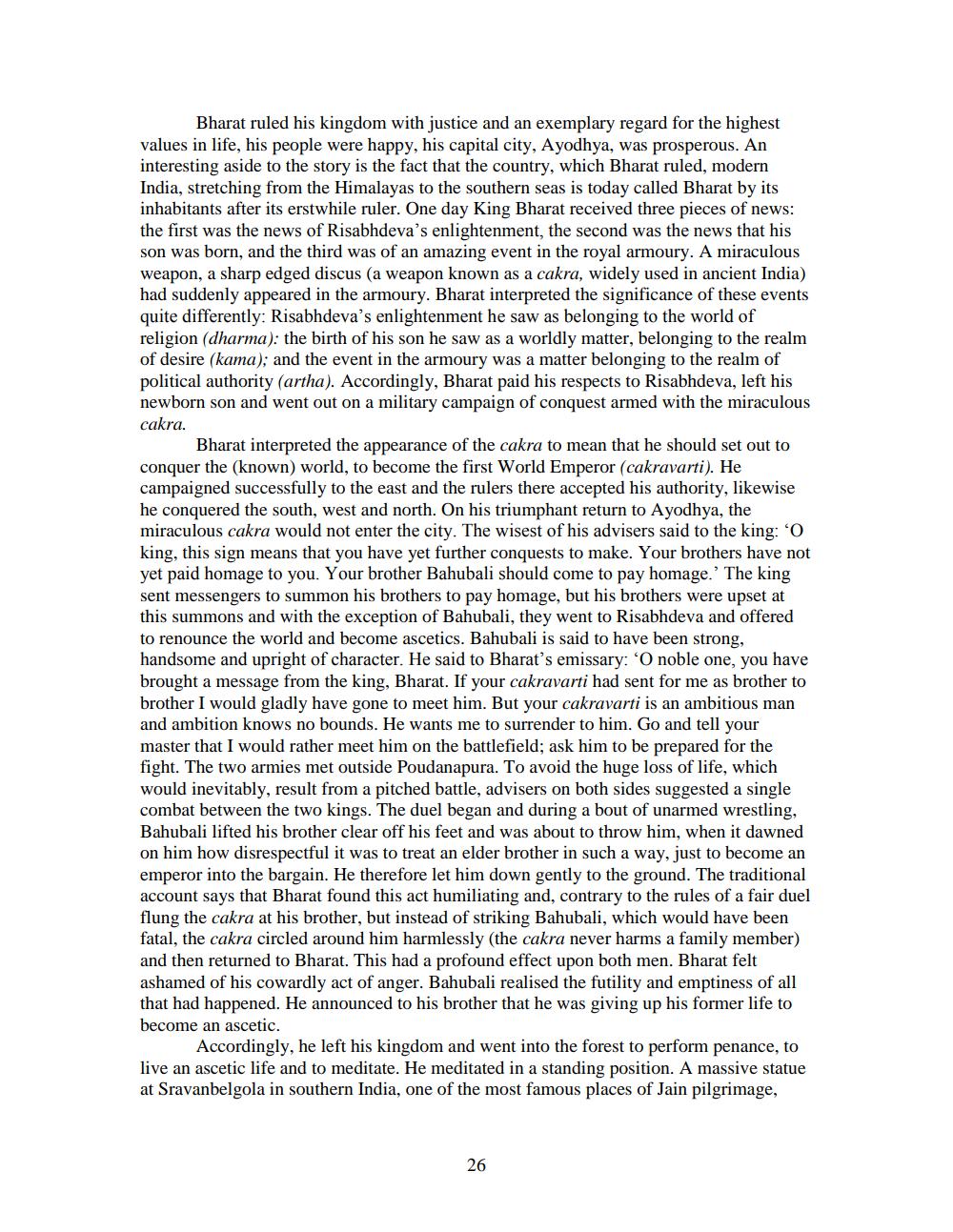________________
Bharat ruled his kingdom with justice and an exemplary regard for the highest values in life, his people were happy, his capital city, Ayodhya, was prosperous. An interesting aside to the story is the fact that the country, which Bharat ruled, modern India, stretching from the Himalayas to the southern seas is today called Bharat by its inhabitants after its erstwhile ruler. One day King Bharat received three pieces of news: the first was the news of Risabhdeva's enlightenment, the second was the news that his son was born, and the third was of an amazing event in the royal armoury. A miraculous weapon, a sharp edged discus (a weapon known as a cakra, widely used in ancient India) had suddenly appeared in the armoury. Bharat interpreted the significance of these events quite differently: Risabhdeva's enlightenment he saw as belonging to the world of religion (dharma): the birth of his son he saw as a worldly matter, belonging to the realm of desire (kama); and the event in the armoury was a matter belonging to the realm of political authority (artha). Accordingly, Bharat paid his respects to Risabhdeva, left his newborn son and went out on a military campaign of conquest armed with the miraculous cakra.
Bharat interpreted the appearance of the cakra to mean that he should set out to conquer the (known) world, to become the first World Emperor (cakravarti). He campaigned successfully to the east and the rulers there accepted his authority, likewise he conquered the south, west and north. On his triumphant return to Ayodhya, the miraculous cakra would not enter the city. The wisest of his advisers said to the king: 'O king, this sign means that you have yet further conquests to make. Your brothers have not yet paid homage to you. Your brother Bahubali should come to pay homage.' The king sent messengers to summon his brothers to pay homage, but his brothers were upset at this summons and with the exception of Bahubali, they went to Risabhdeva and offered to renounce the world and become ascetics. Bahubali is said to have been strong, handsome and upright of character. He said to Bharat's emissary: 'O noble one, you have brought a message from the king, Bharat. If your cakravarti had sent for me as brother to brother I would gladly have gone to meet him. But your cakravarti is an ambitious man and ambition knows no bounds. He wants me to surrender to him. Go and tell your master that I would rather meet him on the battlefield; ask him to be prepared for the fight. The two armies met outside Poudanapura. To avoid the huge loss of life, which would inevitably, result from a pitched battle, advisers on both sides suggested a single combat between the two kings. The duel began and during a bout of unarmed wrestling, Bahubali lifted his brother clear off his feet and was about to throw him, when it dawned on him how disrespectful it was to treat an elder brother in such a way, just to become an emperor into the bargain. He therefore let him down gently to the ground. The traditional account says that Bharat found this act humiliating and, contrary to the rules of a fair duel flung the cakra at his brother, but instead of striking Bahubali, which would have been fatal, the cakra circled around him harmlessly (the cakra never harms a family member) and then returned to Bharat. This had a profound effect upon both men. Bharat felt ashamed of his cowardly act of anger. Bahubali realised the futility and emptiness of all that had happened. He announced to his brother that he was giving up his former life to become an ascetic.
Accordingly, he left his kingdom and went into the forest to perform penance, to live an ascetic life and to meditate. He meditated in a standing position. A massive statue at Sravanbelgola in southern India, one of the most famous places of Jain pilgrimage,




